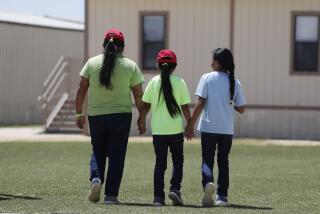Legal aid groups for immigrants can resume work in detention centers after DOJ backs down

- Share via
Legal aid groups say the Trump administration will allow them back in immigration courts and detention centers, for now.
The nonprofit groups and immigration attorneys they contract were informed on Sunday that the Department of Justice had given notice that a “stop-work order” sent out Jan. 22 “has been rescinded” with little explanation.
The move came two days after nine nonprofits that provide legal aid for detainees and about 200 children in deportation proceedings filed a lawsuit in the U.S. District Court for the District of Columbia. The suit challenged the administration’s order to halt federally funded legal programs.
The decision is “a major win for due process and a blow to the president’s attempts to roll back protections afforded under the law,” said Michael Lukens, executive director of Amica Center for Immigrant Rights, which led the suit and is one of 18 nonprofits that operate such programs.
The legal service programs provide a help desk in busy immigration courtrooms including in Los Angeles, San Francisco and San Diego, basic legal information for individuals and families in detention facilities in 12 states and lawyers for minors, some of whom may be separated from their families.
In suspending the programs, the agency cited Trump’s executive order commanding members of his Cabinet to pause funding for contracts and grants that provide services to immigrants without legal status. It calls for the termination of contracts where it finds waste and fraud.
Lawyers for the group argued that Congress had already appropriated $28 million in funding and that abruptly pausing the programs is a “hasty and pretextual attack on the immigration system” that deprives detainees of information needed to ensure due process.
Federal District Court Judge Randolph D. Moss, who is handling the Amica case, has yet to make a ruling but has asked government attorneys to confirm that full access to detention facilities has been restored, according to lawyers for the plaintiffs.
More to Read
Sign up for Essential California
The most important California stories and recommendations in your inbox every morning.
You may occasionally receive promotional content from the Los Angeles Times.











